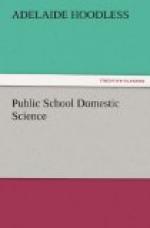Special attention should be given to kitchen ventilation. In order to prevent kitchen odors from penetrating through the other parts of the house, it is necessary to have an outlet for steam and impure air near the ceiling in the kitchen. If windows are placed so as to secure a draft, they may be opened at the top only, when they will serve the purpose admirably. There should be a ventilating flue in all kitchen chimneys. In building a house, see that register ventilators are placed in the kitchen on different walls, which may be closed in very cold weather.
LAUNDRY WORK.
As the first essential of laundry work is a plentiful supply of water, a word concerning that necessary article may not be out of place. Pure water is a chemical compound of hydrogen and oxygen. It has great absorbent and solvent powers, therefore pure water is seldom found. The first fall of any shower is mixed with the impurities of the air; among these may be acids, ammonia and carbon in the form of soot and creosote. It is these impurities which cause the stain left when rain water stands on the window-sill or other finished wood. Rain water absorbs more or less carbon dioxide from various sources, and soaking into the soil often comes in contact with lime, magnesia and other compounds. Water saturated with carbon dioxide will dissolve these substances, forming carbonates or other salts which are soluble; such water is known as “hard.”
Water for domestic uses is called either “hard” or “soft,” according to the amount of salts which it may contain. When soap is added to hard water, the new compound formed by the union of the lime with the fatty acid of the soap is insoluble, and is deposited upon the surface of any article with which it comes in contact. This is the reason why “hard” water requires more soap when used for laundry work. It is much better to soften the water by the addition of alkalies, ammonia or sal-soda before using for laundry purposes than to depend entirely upon soap for cleansing.
Another important material used in the laundry is soap. In purchasing soap, it is safer to choose the make of some well-known firm, who have a reputation to lose if their products are not good; and for anything stronger than soap, it is better to buy sal-soda and use it knowingly than to trust to the various packages so extensively advertised. Washing soda should always be dissolved in a separate vessel, and added to the water to be used. Ammonia may be used, but its too frequent use will yellow bleached fabrics. Borax is an effectual cleanser, disinfectant and bleacher. It is more expensive than ammonia or soda but is the safest alkali to use. Turpentine is valuable in removing grease; 1 tbsp. to a quart of water will serve for washing silks and other delicate materials. It should never be used in hot water.




